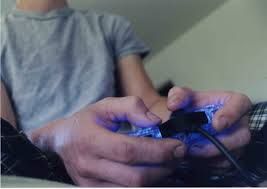ADHD
Gaming Your Way to a More Focused Brain
Boston company seeks FDA approval for video games as a treatment for ADHD
Posted July 25, 2013
by Laura Entis

“Gameification”—the term for using game-like techniques in a non-game context to engage users and solve problems—has been cropping up everywhere: game incentives have been used to do everything from rewarding loyal customers to motivating employees. Is it possible, then, to gamify the way we treat neurological disorders?
Multiple companies are betting on it.
Boston-based Akili Interactive Labs is currently one of several companies seeking Food and Drug Administration approval for the use of their video games to treat neurological disorders, including ADHD.
The term gameification has arguably been overused and lost much of its luster, but Eddie Martucci—Akili’s co-founder—was quick to emphasize that the company’s methods are not a gimmick; Akili's team consists of both veterans from the video game industry (including Matthew Omernick, former Executive Art Director at LucasArts and longtime employee of Electronic Arts) and leading neuroscientists (like Adam Gazzley, director of the Neuroscience Imaging Center at UCSF Medical Center). Together, Martucci says, these two groups are working to create games that entertain while delivering “validated cognitive neuroscience.”
Previous research has linked recreational video games to improvements in visual attention. Akili hopes to build on this serendipitous correlation by creating games designed, through rigorous testing, to target specific areas of the brain, especially regions that are weak or underdeveloped in ADHD populations.
The disorder, which is estimated to affect 9 percent of children and 4.2 percent of adults, is characterized by an impairment or developmental delay in executive functions, which are housed in the frontal lobes of the brain—specifically the prefrontal cortex—and are responsible for regulating cognitive processes like attention, planning, working memory, and task switching. As a result, those with ADHD display hyperactivity, an inability to focus, and heightened impulsive behavior.
If successful, Akili's games will create an experience as enjoyable as playing a recreational video game, but one that systematically engages the pre-frontal cortex, where executive functions are known to reside. “We really are exploring both the potential of using our games by themselves, as well as in a complimentary fashion with medication,” says Eric Elenko, Akili's Chief Business Officer.
Stephanie Sarkis, an ADHD specialist, is unsure if video games can actively improve the function of the frontal lobes in an ADHD brain.“More research needs to be done comparing 'brain games' to placebo, and comparing subjects with ADHD versus a control group,” she says.
On the other hand, Lara Honos-Webb, a clinical psychologist who works with ADHD patients and the author or multiple books on the disorder, says that with practice, is it possible to change and strengthen the brain. She is cautiously optimistic about the possibility of an FDA-approved video game that treats ADHD.
“In theory, it's a great idea for overcoming task initiation,” she says. It's often difficult to get kids with ADHD to start a task that requires focus (such as a homework assignment), much less complete it, even though research shows that this process can be practiced and improved. “To me, the promise is that these video games will be so interesting to the kids that they will go at a task again, and again.”
She has concerns, however. “There is a big gap between improving cognitive function and having a better life,” she says, questioning a video game’s ability—even one that noticeably improves executive functions like attention—to translate into a similar improvements in a child's ability to concentrate in a classroom setting, “where you have a slowly evolving stream of information.”
Her final analysis rests, unsurprisingly, on a video game’s ability to obtain FDA approval. “At the end of the day, if it gets FDA approval, then the research shows that it was efficacious, and that it solves the problems it was meant to solve,” she said. If Akili's or any other company’s games are able to indicate marked improvements in academic achievement (which, according to new research, ADHD medication fails to do) it would be a major breakthrough in ADHD treatment, Honos-Webb believes.
She worries, though, that the message will get confused: “I can imagine parents getting the sense that the FDA says that all video games are good for ADHD when actually we know the opposite.” Research has shown that ADHD kids are more susceptible to video game addiction than their typically developing peers, which can often lead to feelings of isolation and depression. “In my clinical practice, video games are a downfall for many of my clients,” Honos-Webb says.
Sarkis has also seen many patients develop unhealthily obsessions with video games, at the expense of work and family relationships.
It would be crucial, both Honos-Webb and Sarkis stress, for the public to understand that an FDA-approved video game is not equivalent to a recreational one: “Videotapes are very negative for people struggling with obesity,” Honos-Webb says, “but does that mean you shouldn't build a Wii fit game that uses the same technology?”
Currently, Akili is testing a single game, with pilot studies being conducted measuring it's effect on both ADHD and depressed populations. “We built our initial model to be relatively age and gender neutral,” Martucci says. Although Martucci would not divulge the specific features of their current prototype, he did stress that a close working relationship between video game veterans and neuroscientists is crucial to the game's design.
As the company continues to conduct clinical studies and refine their research, Martucci predicts that they will begin to customize, creating a range of games each tailored for an individual demographic. “As we do these pilot tests and learn which specific features on a demanding video game are actually the most appealing to, say, an ADHD child versus an adult with depression, then we are able to start making tweaks,” he says.
Martucci is hesitant to put a firm date on when Akili games will be available to the public, although he believes the release won't come for at least a couple of years—enough time to collect the clinical data that would back going to market. By then, he thinks, the public will be more familiar with the concept of brain training, a field that is gaining exposure.




